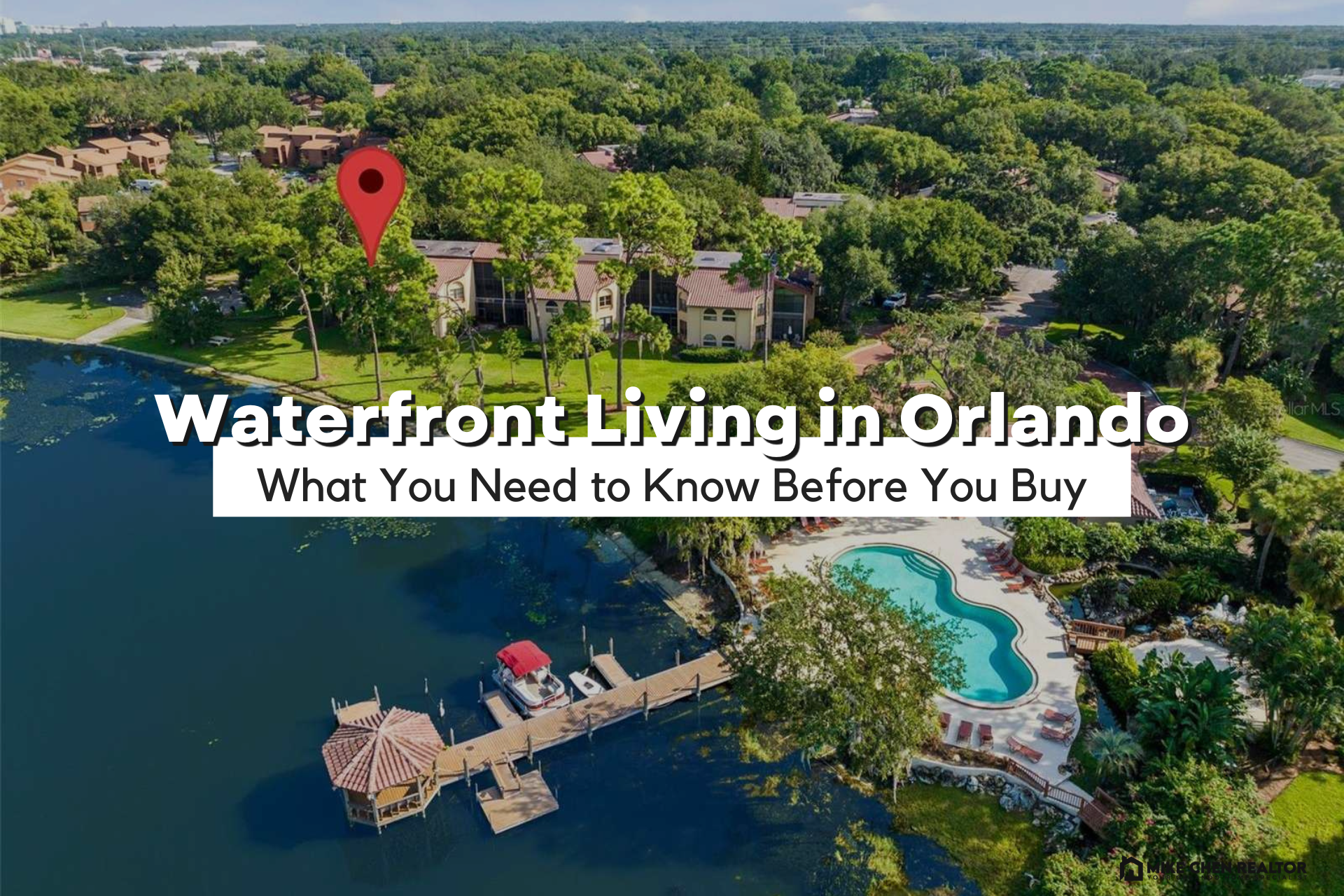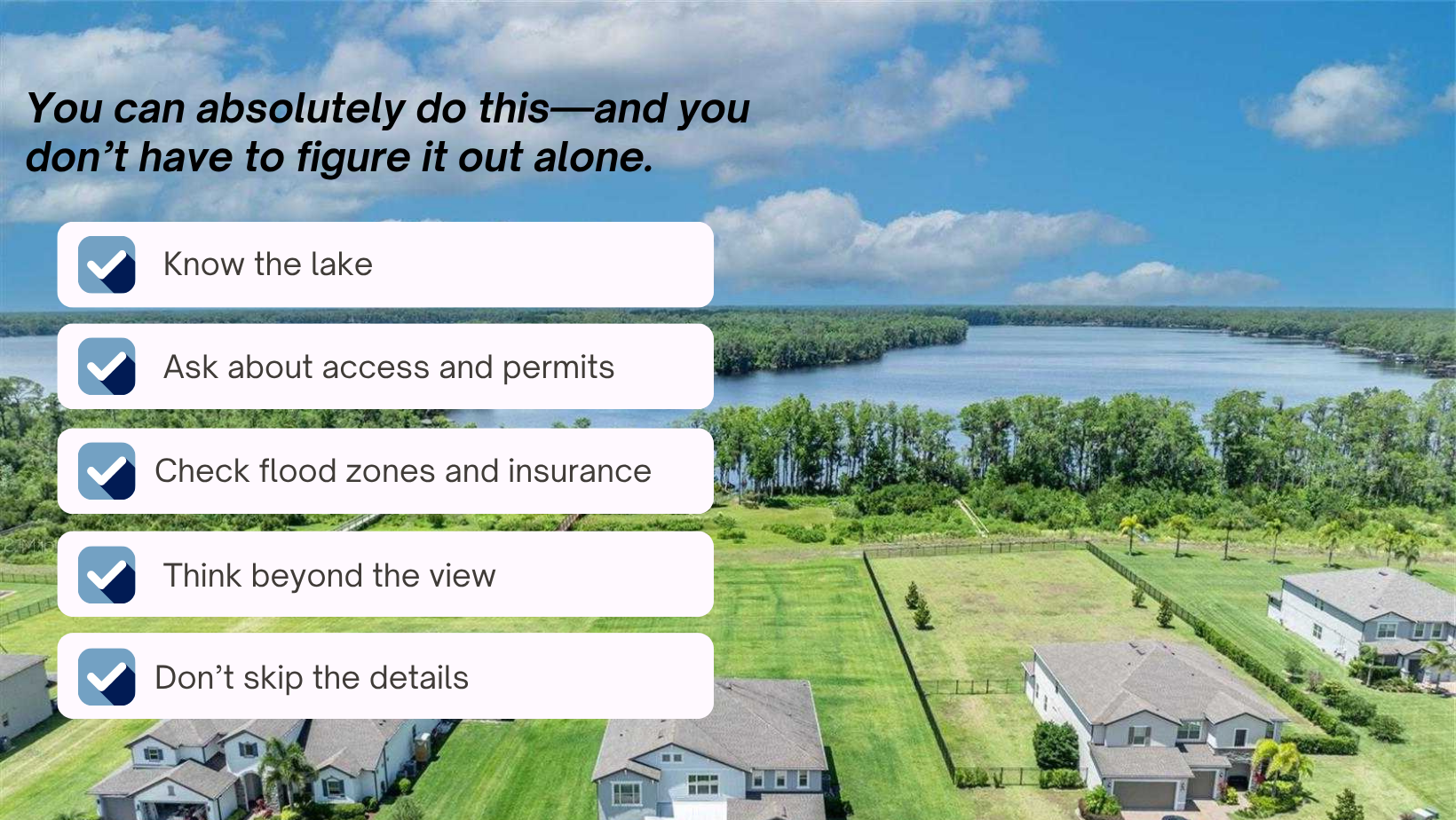I get it—you’ve seen the lake views, the paddleboards, the sunsets over the water, and now you’re thinking: “I need this.”
And honestly? You’re not wrong.
Waterfront homes in Orlando offer an incredible lifestyle—peaceful mornings, great investment potential, and a front-row seat to Florida’s natural beauty.
But here’s the thing: buying a lakefront property isn’t the same as buying a regular home. There are hidden rules, extra costs, and more to consider than just the view.
Before you fall in love with a listing, let’s walk through what you really need to know—so you don’t end up with a beautiful mistake.
1. Know Your Waterfront: Not All Lake Homes Are Equal
Here’s something a lot of excited buyers miss: not every “waterfront” home actually gives you access to the water.
Some listings say “lake view,” but you can’t build a dock or even walk down to the shoreline. Others might give you “community lake access,” which means you’re sharing space with 50 other homeowners—and their weekend party boats.
If you’re buying a lakefront property in Orlando, you need to know what you’re really getting. Here’s a quick breakdown:
Waterfront: The property touches the water. You might be able to build a dock (with permits), launch your kayak, or fish from your backyard. This is the real deal.
Waterview: You can see the lake, but there’s land or sometimes a road between you and the shoreline. Pretty? Sure. But don’t expect private access.
Water Access: There’s a path, trail, or shared dock nearby, but your lot isn’t on the water.
Water Privileges: Your HOA may offer lake use rights but no view, no personal dock, and limited control.
And then there’s the lake itself. Is it public or private? Loud or quiet? Clear or weedy? Can you actually swim in it—or just look at it?
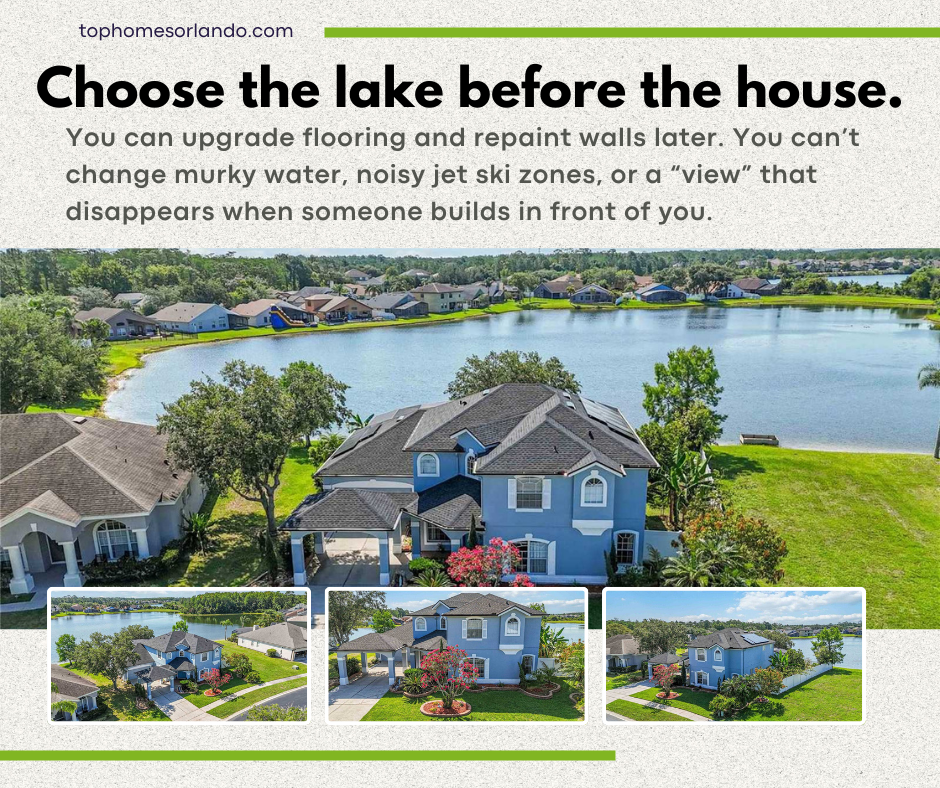
2. Water Rights, Dock Access & Permits
You’d be surprised how many “waterfront” buyers don’t realize until it’s too late… that they don’t actually own the shoreline—or can’t legally build a dock.
In Orlando, water rights can be more complicated than you’d expect. Just because your backyard touches a lake doesn’t mean you can treat it like your personal marina.
Let’s break down what you must ask before signing a contract:
Ask These 5 Questions Before You Assume Anything:
Can I legally access the shoreline from my yard?
Some homes are separated from the water by a strip of land owned by the community, county, or HOA. That means it’s not your shoreline, even if it looks like it.Can I build or rebuild a dock?
Dock permits in Orlando are handled by city, county, or even lake-specific agencies.
You’ll need to verify:If a dock already exists, is it permitted and up to code?
Can you install a new one—and how big can it be?
Are there restrictions on building materials or placement?
Is the lake private or public?
If the lake is public, expect more boat traffic, fishing, and people near your property. If it’s private, there may be usage rules but you’ll get more peace and privacy. Always ask what type of lake access your deed includes.What kinds of boats are allowed?
Some lakes in the Orlando area restrict:Motor size or type (no gas-powered engines)
Wake activity (no jet skis or wakeboarding)
Speed limits
Others might allow everything great for boaters, but noisier for people who just want a calm paddle at sunrise.Who maintains the water and shoreline?
Is it the city? A lake management board? Your HOA? If no one’s in charge, water quality and shoreline upkeep can suffer and so will your property value.
Real Talk: The Dock Is Just the Start
Even if a dock is allowed, some Orlando-area communities require you to:
Get engineering drawings approved
Use specific contractors
Maintain setbacks from neighboring property lines
Avoid shading protected aquatic vegetation (yes, that’s a thing)
And if you think “Oh, I’ll just build it and deal with the fine later”—don't. Unpermitted structures near Florida’s lakes can lead to removal orders, daily fines, and legal headaches.
Trust me: it’s not worth the shortcut.
HOA or Lake Association? Read Every Page.
In communities like Winter Park, Lake Nona, or parts of Windermere, the lake might have its own set of rules, separate from the neighborhood HOA.
That means you could be double-regulated:
One group telling you how your dock should look
Another telling you how many people can be on it
And neither of them cares how much you paid for the house.
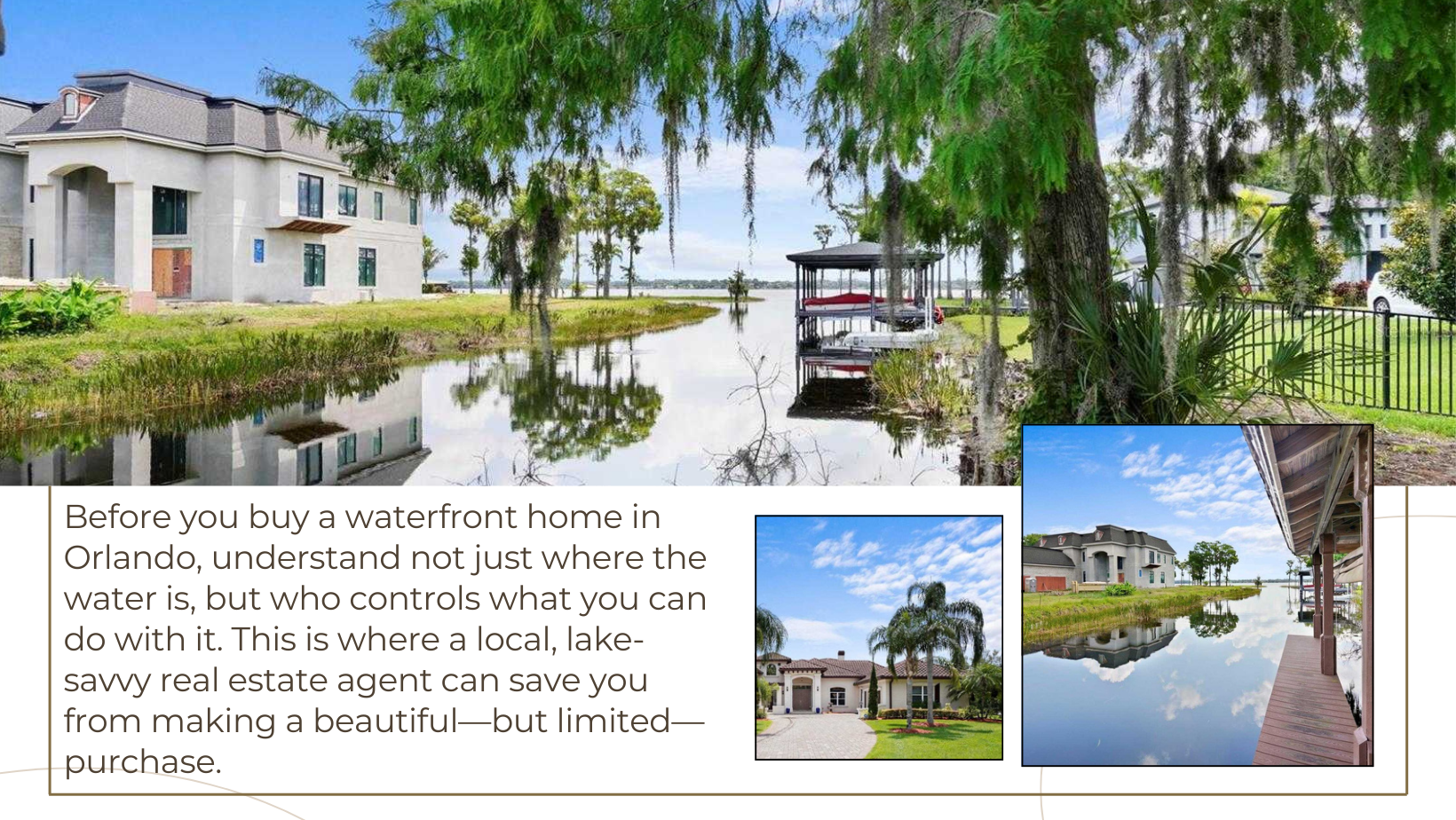
3. Flood Zones & Insurance Planning
Let’s be honest: water is beautiful… until it rises where it shouldn’t.
Even if the lake behind your dream home has never flooded, that doesn’t mean it won’t. Florida weather can flip fast, and in many areas around Orlando, flood zones matter more than buyers realize.
Here’s what you need to know before you buy:
What Exactly Is a Flood Zone?
A flood zone is a FEMA-defined area that’s more likely to experience flooding based on elevation, water flow, and history. It affects:
Whether you need flood insurance
What kind of loan you qualify for
How much your monthly costs might be
There are different flood zone labels:
Zone AE or A = high risk (mandatory flood insurance with most lenders)
Zone X (shaded) = moderate risk
Zone X (unshaded) = minimal risk
The catch? Even homes in "low-risk" zones can—and do—flood, especially with Orlando’s summer storms. 📍
How Much Is Flood Insurance in Orlando?
It depends on where you are, how high your home sits, and what type of coverage you want. On average:
Basic flood insurance can cost $400–$1,200 per year
In high-risk areas, it could run $2,000+ annually
And regular homeowners insurance doesn’t cover flooding. That’s a separate policy entirely.
If you're using a mortgage, most lenders will require you to carry flood insurance in higher-risk zones. 💰
Why It Matters (Even If You’re Paying Cash)
Even if you’re a cash buyer or the flood zone is technically “low risk,” not having flood insurance could expose you to:
Out-of-pocket repair costs (roof leaks, foundation damage, ruined interiors)
Longer days on market when you sell (smart buyers will ask)
Unexpected expenses from rising insurance rates or FEMA re-zoning
And remember: flood maps change. What’s Zone X now could be AE in a few years, especially with new construction or rising water levels. 💡
Pro Tip: Get an Elevation Certificate
Before you close on a lakefront property in Orlando, ask for an Elevation Certificate. It tells you exactly how your home sits relative to sea level.
Lenders and insurance companies use it to calculate risk—and it could lower your premium or save you from buying the wrong house.
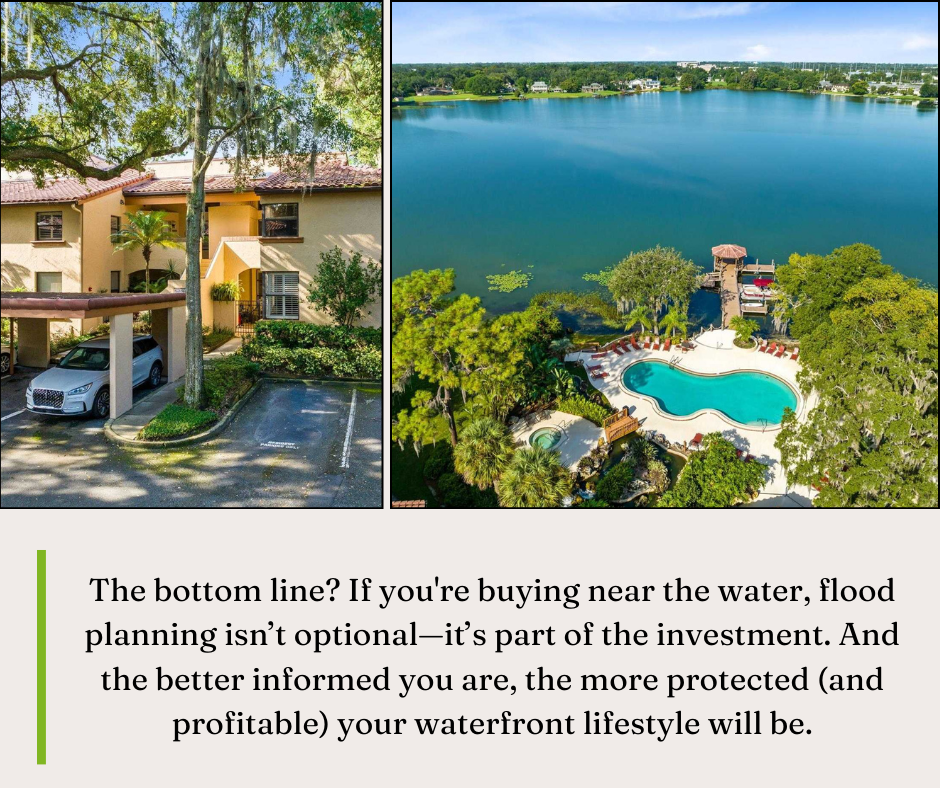
4. Shoreline Condition & Long-Term Maintenance
Okay, let’s say the house looks great. The lake view is amazing. You're already picturing weekend barbecues on the dock.
Now… look down.
The shoreline is where your real problems can hide.
Most buyers focus on the house—but with waterfront homes in Orlando, what’s happening at the edge of the water can make or break your investment.
Here’s what you need to check (even if you’ve never thought about it before):
Is the shoreline stable?
You want to look for:
Signs of erosion (sloped land washing away, exposed roots, muddy runoff)
Crumbling or leaning seawalls or retaining walls
Water lines or stains showing how high the lake rises
Florida lakes rise and fall with the rainy season. If that shoreline isn’t reinforced, you could be footing the bill for repairs later—especially after a summer storm.
💡 Tip: If it looks like the backyard’s been shrinking, it probably has.
Can you modify or protect the shoreline?
You can’t just stack some rocks and call it a day. In many areas, especially in Orange and Osceola counties:
You need permits to build a seawall or place riprap (those chunky rocks that stabilize the shore)
Wetlands or conservation areas have strict limits on what you can touch
Your HOA might have rules about what kind of materials you can use
So before you plant that palm tree or install a little beach, check:
County shoreline codes
Lake association rules
State environmental guidelines (yep, really)
What kind of maintenance will the shoreline need?
Just like a roof or pool, the shoreline needs regular attention. Depending on the setup, you may be responsible for:
Replacing seawalls (which can cost $10,000+ easily)
Treating for aquatic weeds or algae blooms
Cleaning or repairing docks, decks, or lifts
Managing runoff or drainage to avoid slope collapse
Some HOAs handle this for you—many don’t. And city or county maintenance? Rare, unless you’re on a public-access lake.
Is the water quality safe?
Some lakes are dredged or chemically treated to reduce algae—others are not.
Lakes that look green or murky might have low oxygen levels or runoff problems from nearby homes.
If you’re planning to swim or let kids play in the water, ask for a recent water quality test—especially for smaller, private lakes.
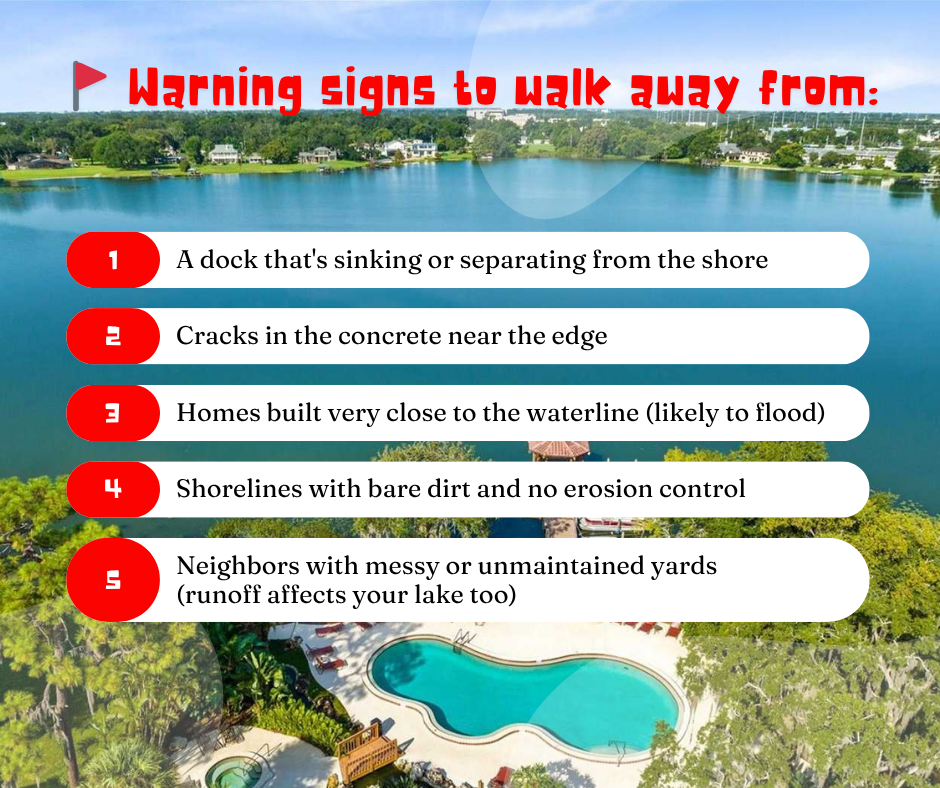
Let’s be real—lakefront property in Orlando is worth the premium when the shoreline is in good shape. But if the land’s not stable, the water’s not safe, or the maintenance is overwhelming, your dream home can become a very expensive headache.
The goal? Don’t just look at the lake—inspect everything that touches it.
5. Infrastructure: Septic, Sewer & Connectivity
Let’s be honest—when people fall in love with a lake home, they’re not thinking about what’s underground… or what kind of internet plan they can get.
But if you’re going to live there—or even just rent it out—you need to know how well the house actually works.
Here’s what I tell every waterfront buyer in Orlando: just because it’s beautiful doesn’t mean it’s functional.
Let’s break it down.
Is the home on septic or city sewer?
Here’s the thing: some lakefront homes—especially older ones or those on smaller, private lakes—aren’t connected to Orlando’s city sewer system.
Instead, they rely on septic tanks. That’s not always a bad thing, but here’s what it means:
Septic systems require regular maintenance—you’ll need to pump them every 3–5 years
They’re sensitive—too many guests, long showers, or flushing the wrong stuff can cause backups
They need distance from the shoreline to avoid contamination (and if they’re too close, you may have to replace them)
💡 A new septic system can cost anywhere from $8,000–$15,000.
So if you’re buying a home with an old tank, factor that into your budget.
Is the water source private or public?
Some lake homes use well water, especially if they’re further from city lines. While that can save money, it also means:
You’ll want to test the water regularly (especially if you plan to swim or cook with it)
You may need filtration systems to remove iron, sulfur, or bacteria
Wells can run dry—or require expensive repairs if something fails
Ask the seller:
Are you on city water or in a private well?
When was the last water test?
Do you use any kind of water softener or filtration?
What’s the internet and phone situation?
You’d be surprised how many gorgeous homes on beautiful lakes have... zero bars and 15 Mbps of rural internet.
If you plan to work from home, stream Netflix, or run a smart security system, that matters.
Here’s what to check:
Does the home have fiber or cable internet access? (Xfinity, Spectrum, AT&T Fiber)
Is it satellite only? (Slower and less reliable)
What’s the average upload/download speed in that zip code?
Are cell signals strong indoors?
💡 Tip: Run a speed test on-site and check signal bars in different rooms during your showing.
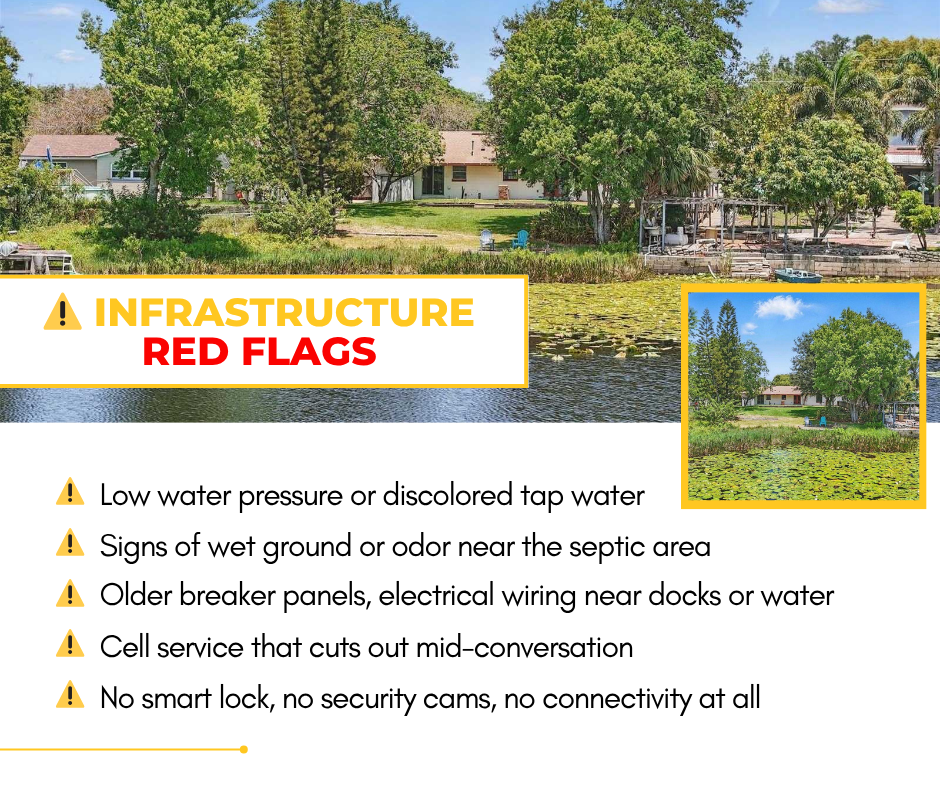
6. What to Look for When Touring Lake Homes
So you’re walking through a lakefront property, and it’s giving you all the feels—the view is stunning, the kitchen is shiny, and the dock looks like the perfect Instagram backdrop.
Pause.
Before you get too excited, here’s what you should actually be looking at during a showing—because some of the most expensive problems are the easiest to overlook.
First, step outside.
Walk all the way down to the water. Does it look safe and accessible?
Is the shoreline clean or eroding? Are the steps or dock solid?
Check if the lake is loud or peaceful. If it’s quiet now, imagine it on a Saturday with boats and jet skis.
Look next door. Are the neighboring properties well-kept? Run-down? That affects value too.
Now head back in.
Open windows. Do you smell must or mildew? Lake homes are prone to humidity.
Check for signs of flooding near baseboards, garages, or utility rooms.
Look up, any staining on the ceiling or around vents?
Ask where the water heater, septic tank, or electrical panels are. Don’t assume everything’s been updated.
Ask direct questions:
Has the property ever flooded?
Do they have flood insurance?
Are there dock permits or any restrictions from the HOA?
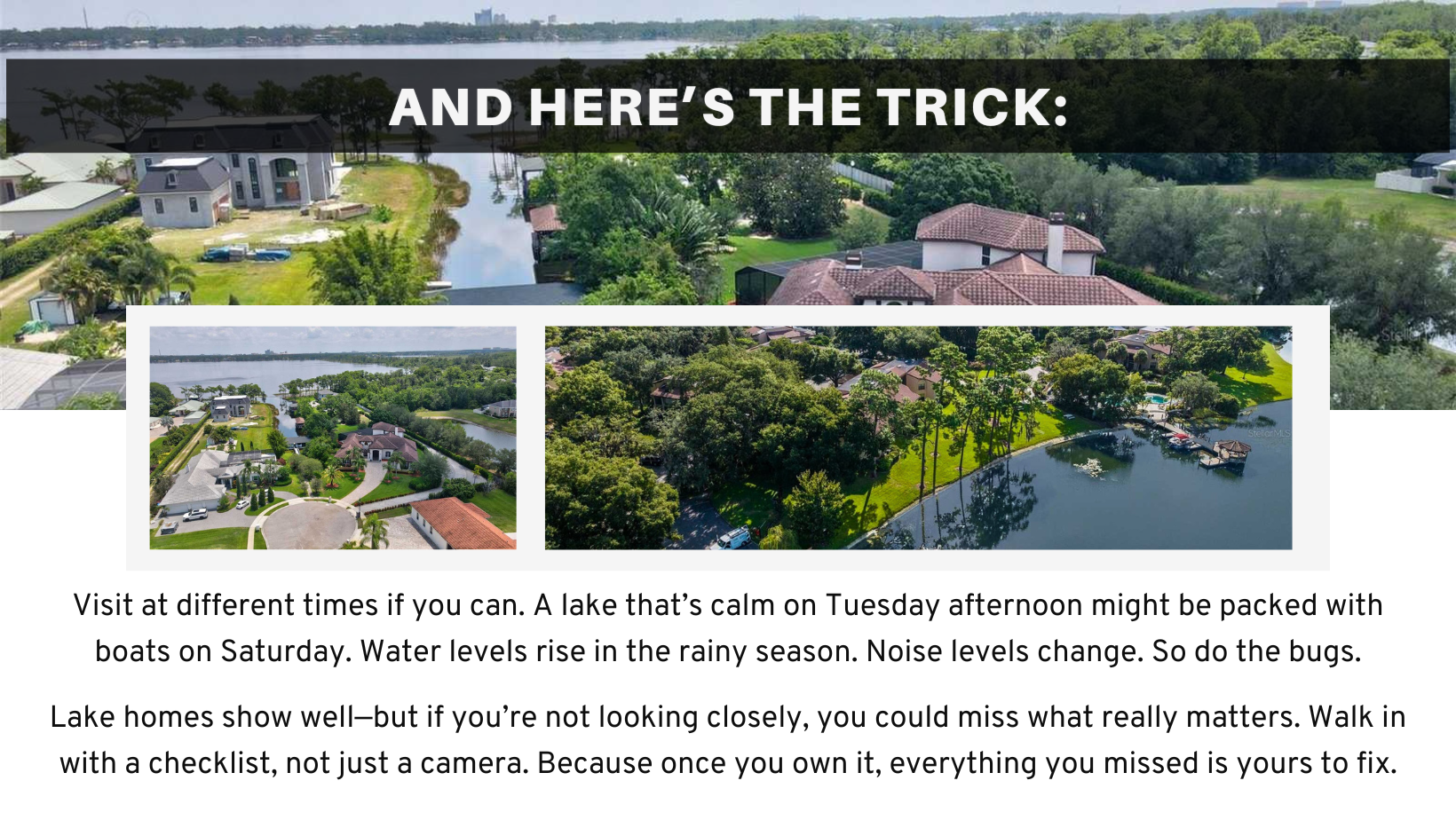
7. Lifestyle Considerations & Daily Living
Lakefront living is peaceful—until it’s not.
Weekdays are quiet. Weekends? Expect jet skis, boat traffic, and party noise. If you want calm, pick a smaller private lake. If you want activity, go bigger—but expect the buzz.
You’ll also deal with nature. Think ducks on your dock, bugs near the lights, and maybe a gator sighting or two. It’s Florida. It comes with the territory.
And don’t forget the basics:
How far is the grocery store?
Do you get good Wi-Fi?
Is this your full-time home or just a getaway?
Some lake homes feel remote—great for weekends, but maybe not for everyday errands or school runs.
Common Mistakes to Avoid
If you take anything from this guide, take this: buying a lakefront home isn’t something you rush. These are the most common (and costly) mistakes I’ve seen people make:
Assuming you can build a dock.
Just because the water’s there doesn’t mean you can touch it. Always check shoreline ownership and dock permits.
Not checking flood zones.
One bad storm, and your “low-risk” backyard becomes a shallow pool. Get an elevation certificate. Ask about past claims.
Falling for the view—and skipping the inspection.
The house might be pretty, but what’s under it? Mold, septic issues, or a crumbling seawall can ruin everything.
Ignoring HOA and lake rules.
Yes, some places ban jet skis. Others restrict dock lights. Don’t buy until you’ve read the fine print.
Trying to “just figure it out later.”
Waterfront homes come with extra costs, extra rules, and extra risks. The people who win with them? They plan ahead.
You don’t need to be scared—you just need to be smart. Ask the right questions now, and you’ll thank yourself every time you watch the sunset from your dock, stress-free.
A Lake Home Is a Dream—But Buy It Smart
Waterfront homes in Orlando are special. But they’re also different from any other type of real estate.
You’re not just buying a house—you’re buying shoreline, access, risk, and responsibility. And when you understand that upfront, you’re setting yourself up to enjoy the lifestyle you’re dreaming about—without regrets.
I help buyers like you find the right waterfront home every day. If you want real advice, local insight, and someone who’s walked this shoreline before—let’s talk.



